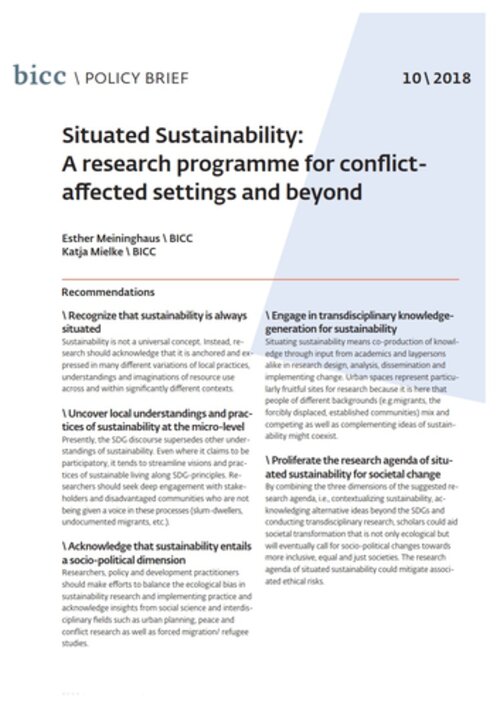Publications
Situated sustainability: A research programme for conflict-affected settings and beyond
Release Date
2018-10
Language
- English
Topics
- –
In BICC Policy Brief 10\2018 the authors Esther Meininghaus and Katja Mielke introduce the concept of situated sustainability: Situated sustainability comprises local practices, understandings and imaginations of resource use across and within significantly different contexts (spatial and other) and, possibly, forms of social ordering (e.g. pro equal participation) that enable future generations to meet their own needs within specific localities.
In particular they give the following recommendations:
\ Recognize that sustainability is always situated
Sustainability is not a universal concept. Instead, research should acknowledge that it is anchored and expressed in many different variations of local practices, understandings and imaginations of resource use across and within significantly different contexts.
\ Uncover local understandings and practices of sustainability at the micro-level
Presently, the SDG discourse supersedes other understandings of sustainability. Even where it claims to be participatory, it tends to streamline visions and practices of sustainable living along SDG-principles. Researchers should seek deep engagement with stakeholders and disadvantaged communities who are not being given a voice in these processes (slum-dwellers, undocumented migrants, etc.).
\ Acknowledge that sustainability entails a socio-political dimension
Researchers, policy and development practitioners should make efforts to balance the ecological bias in sustainability research and implementing practice and acknowledge insights from social science and interdisciplinary fields such as urban planning, peace and conflict research as well as forced migration/ refugee studies.
\ Engage in transdisciplinary knowledge-generation for sustainability
Situating sustainability means co-production of knowledge through input from academics and laypersons alike in research design, analysis, dissemination and implementing change. Urban spaces represent particularly fruitful sites for research because it is here that people of different backgrounds (e.g. migrants, the forcibly displaced, established communities) mix and competing as well as complementing ideas of sustainability might coexist.
\ Proliferate the research agenda of situated sustainability for societal change
By combining the three dimensions of the suggested research agenda, i.e., contextualizing sustainability, acknowledging alternative ideas beyond the SDGs and conducting transdisciplinary research, scholars could aid societal transformation that is not only ecological but will eventually call for socio-political changes towards more inclusive, equal and just societies. The research agenda of situated sustainability could mitigate associated ethical risks.
PDF-Download
BICC_Policy_Brief_10_2018.pdf
[English] (175.79 KB)

Cite as
@techreport{MeininghausMielke2018,
author = "Esther Meininghaus and Katja Mielke",
title = "Situated sustainability: A research programme for conflict-affected settings and beyond",
latexTitle = "Situated sustainability: A research programme for conflict-affected settings and beyond",
publisher = "BICC",
number = "10",
institution = "BICC",
type = "BICC Policy brief",
year = "2018",
address = "Bonn",
}
Document-Type
BICC Policy brief
Publisher
BICC
Place
Bonn



